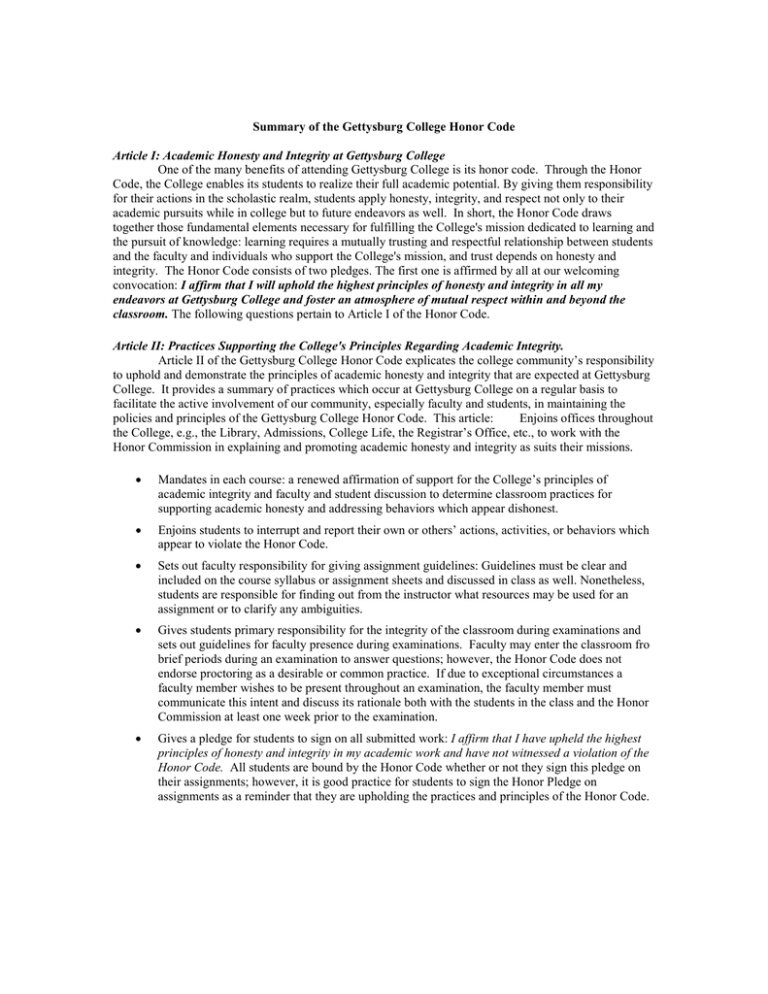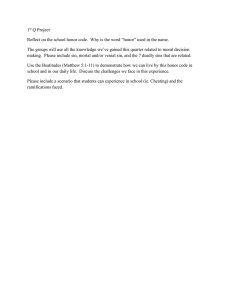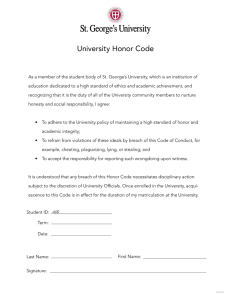Summary of the Gettysburg College Honor Code
advertisement

Summary of the Gettysburg College Honor Code Article I: Academic Honesty and Integrity at Gettysburg College One of the many benefits of attending Gettysburg College is its honor code. Through the Honor Code, the College enables its students to realize their full academic potential. By giving them responsibility for their actions in the scholastic realm, students apply honesty, integrity, and respect not only to their academic pursuits while in college but to future endeavors as well. In short, the Honor Code draws together those fundamental elements necessary for fulfilling the College's mission dedicated to learning and the pursuit of knowledge: learning requires a mutually trusting and respectful relationship between students and the faculty and individuals who support the College's mission, and trust depends on honesty and integrity. The Honor Code consists of two pledges. The first one is affirmed by all at our welcoming convocation: I affirm that I will uphold the highest principles of honesty and integrity in all my endeavors at Gettysburg College and foster an atmosphere of mutual respect within and beyond the classroom. The following questions pertain to Article I of the Honor Code. Article II: Practices Supporting the College's Principles Regarding Academic Integrity. Article II of the Gettysburg College Honor Code explicates the college community’s responsibility to uphold and demonstrate the principles of academic honesty and integrity that are expected at Gettysburg College. It provides a summary of practices which occur at Gettysburg College on a regular basis to facilitate the active involvement of our community, especially faculty and students, in maintaining the policies and principles of the Gettysburg College Honor Code. This article: Enjoins offices throughout the College, e.g., the Library, Admissions, College Life, the Registrar’s Office, etc., to work with the Honor Commission in explaining and promoting academic honesty and integrity as suits their missions. • Mandates in each course: a renewed affirmation of support for the College’s principles of academic integrity and faculty and student discussion to determine classroom practices for supporting academic honesty and addressing behaviors which appear dishonest. • Enjoins students to interrupt and report their own or others’ actions, activities, or behaviors which appear to violate the Honor Code. • Sets out faculty responsibility for giving assignment guidelines: Guidelines must be clear and included on the course syllabus or assignment sheets and discussed in class as well. Nonetheless, students are responsible for finding out from the instructor what resources may be used for an assignment or to clarify any ambiguities. • Gives students primary responsibility for the integrity of the classroom during examinations and sets out guidelines for faculty presence during examinations. Faculty may enter the classroom fro brief periods during an examination to answer questions; however, the Honor Code does not endorse proctoring as a desirable or common practice. If due to exceptional circumstances a faculty member wishes to be present throughout an examination, the faculty member must communicate this intent and discuss its rationale both with the students in the class and the Honor Commission at least one week prior to the examination. • Gives a pledge for students to sign on all submitted work: I affirm that I have upheld the highest principles of honesty and integrity in my academic work and have not witnessed a violation of the Honor Code. All students are bound by the Honor Code whether or not they sign this pledge on their assignments; however, it is good practice for students to sign the Honor Pledge on assignments as a reminder that they are upholding the practices and principles of the Honor Code. Article III: Breaches of the College's Standards of Academic Honesty and Integrity. Article III sets out basic expectations for students about honesty and integrity in their academic endeavors, gives examples of the kinds of actions and behaviors regarded as breaches of the Honor Code, and sets out two processes for investigating and adjudicating suspected breaches of the Honor Code: a Preliminary Conference and a Hearing Board of the Honor Commission. • In short, students must submit work that is the fruit of their own study and labor, acknowledge assistance, words, and ideas they use in their work, and be honest with all members of the community involved in supporting their education. • Examples of actions subject to the Honor Code: cheating, plagiarism, unauthorized collaboration, unauthorized aid, fabrication of data or documents, forgery on academic forms and documents, lying to gain academic advantage, failure to report actions which clearly indicate violations of the Honor Code, stealing or destroying library materials; dishonesty or intimidation related to a Preliminary Conference or Hearing. • Self-reported violations and violations suspected by others should be reported to the Chair of the Honor Commission or the Dean of Academic Advising. • All suspected breaches of the Honor Code will be investigated through the Preliminary Conference process, and, for first-time complaints, resolved where possible, including the assignment of penalties if appropriate. • The purpose and value of the Preliminary Conference is to support expeditious investigation of complaints; to afford students who have been wrongly accused an opportunity to be vindicated; and to afford students who have acted dishonestly an opportunity to examine their behavior, learn from their mistakes, and begin the process of repairing their breach of our community’s trust and academic values. • Normally, the Preliminary Conference will include: the Dean of Academic Advising (or designee) to convene and facilitate, the accused student, the instructor of the course involved or administrator of the office involved, the Chair of the Honor Commission (or designee), and another member of the College community as advisor to the student, if the student so wishes. • Hearing Boards of the Honor Commission will adjudicate cases of a suspected second breach of the Honor Code, cases not settled through the Preliminary Conference process, and appeal hearings. Article IV: Penalties This article sets out a range of penalties and considerations to inform decisions about penalties for breaches of the Honor Code occurring within the context of individual courses as well as those not directly within the purview of a course. Only a Hearing Board can impose a penalty more severe than failure in a course. • Penalties for breaches outside the purview of a course: restitution and academic suspension alert status; for students already on that status, the matter goes to a Hearing Board for resolution. • Penalties for breaches within the purview of particular courses: reduction of the assignment grade (including to 0), reduction of the course grade (including to F), suspension for 1 or 2 semesters, and expulsion. • Penalties for first time breaches of the Honor Code occurring within the purview of a particular course typically include failure of the assignment, grade reduction, or failure of the course. Penalties for second violation cases normally include suspension or expulsion. • Considerations to inform decisions about penalties: student’s sincerity and understanding of the nature of his or her breach of the College’s principles of academic integrity; the extent to which the act was planned or deliberate and damaged the overall integrity of the College community. Articles V-IX: Hearing Boards and Procedures, Appeal Process, Records, Rights of the Accused and the Accuser, Process of Amendment These articles deal with the procedures of hearing boards, the appeal process, records, the rights of the accused and the accuser, and the process of amendment. While the information within these articles may only appear to be important for those who are accused, these matters are necessary for each student to understand. • The accused student is considered innocent until proven guilty. Hearing boards can determine penalties from the full range available as they deem appropriate. On a case by case basis a Board may make appropriate recommendations to students, such as going to the Writing Center, utilizing Peer Tutoring, or participating in FY orientation with the Honor Commission. • Following a hearing board or preliminary conference, a note is sent to the parents of a student found to have violated the Honor Code. • There is an appeal process available following a hearing board. In order for an appeal to be recognized, a letter must be sent to the Provost within three class days of the original hearing. • Records on Preliminary Conferences, Hearings, and Appeal Boards will be kept for 5 years beyond a student's graduation. JC/Apr 2014



